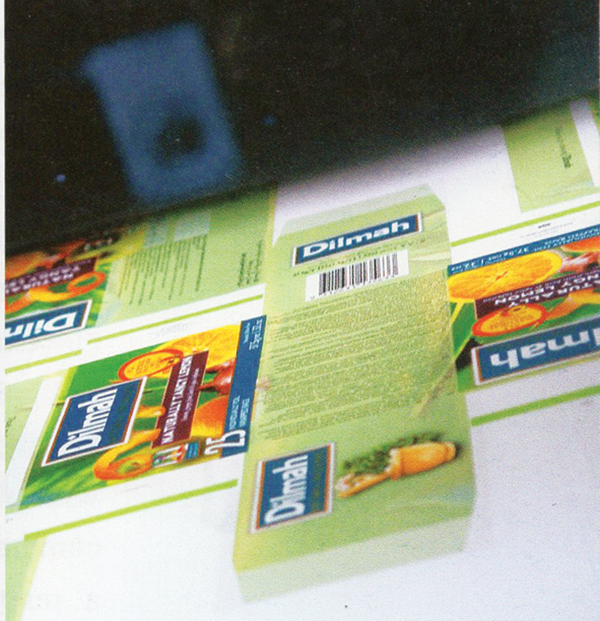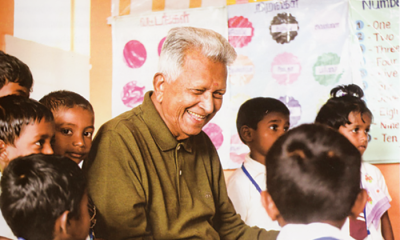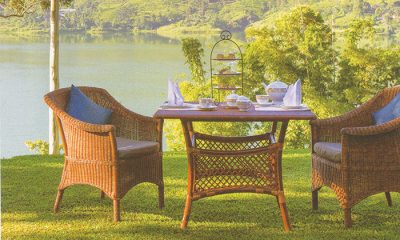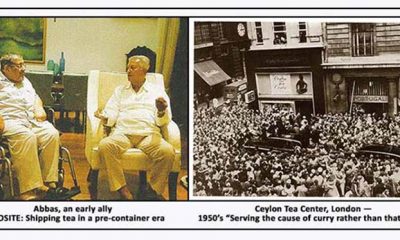Features
Setting up support services for the Dilmah brand

(Excerpted from the autobiography of Merrill J. Fernando)
In the development of my brand Dilmah, what has always been in public view is the brand and the publicity it garners, but not the behind-the-scenes toil, which has contributed to its development over the years. Some of our other successful ventures have also been overshadowed by the Dilmah brilliance. A few such ventures merit mention.
IMA Machines
To project Dilmah into the larger marketing chains, it had to be sold in tea bag form. Such production machines were very expensive, but with this in mind I visited a renowned tea bagging machine manufacturer, IMA, of Italy, a world leader in the design and manufacture of automatic machines for processing and packaging various products, ranging from pharmaceuticals and cosmetics to tea and coffee.
I met its founder, Dr. Andrea Romagnoli, and explained my vision. He agreed to sell me two machines at a special price, but also warned me that I may be many years ahead of the right opportunity for the optimum deployment of the machines. I bought two IMA-C21 machines from him and, visiting him a couple of times a year, also became good friends.
In Italy I also had a very reliable bulk tea agent, Giancarlo Beraldi, ably assisted by his dynamic wife, Edy, who displayed an insatiable curiosity about tea. They supplied bulk tea to the largest companies in Italy and, eventually, I became the major supplier of bulk tea from Ceylon to Italy. The Beraldis were a warm and generous couple who entertained me in the best restaurants in Milan, inculcating in me a lasting love for genuine Italian food.
The two IMA machines arrived and were installed in my Peliyagoda packing plant. However, in ominous confirmation of Dr. Romagnoli’s predictions, they were idle for quite some time. I did not lose heart though, despite a very expensive investment being inactive. I secured its agency in Sri Lanka, as well as the agencies for tea bag filter paper and other related components from J. R. Crompton.
I incorporated a separate company, Package Care Ltd., to market these products. All these initiatives were aspects of my vision for making value addition to tea in Sri Lanka, a realistic prospect for other exporters as well, providing them with a one-stop-shop for the purchase of the required finished material. It would save the potential exporter of value-added tea, the serious inconveniences I experienced in sourcing my requirements from Japan, the UK, and other countries.
About two years after my purchase of the machines, at the first IMA distributors’ conference in Milan, I was invited to speak on the first day. I used the opportunity to share with the participants my vision of value addition at origin and the benefits that would accrue to tea growers and workers as a result. Many found it interesting, challenging, and attractive, but none offered hope for its realization. The UK distributor was scornful, calling me a dreamer!
Printcare
Before I installed my first tea bag machines, I was importing tea bags and envelopes from Japan, a very costly and time-consuming exercise, as shipments often took as long as three months to arrive and if there was a common defect in the printing, the re-order took another three months.
I had just moved into my new office at Alston Place, Colpetty and I would personally go to Ranco Printers, also in close proximity, to get my visiting cards and other stationery printed. It was during this period that I met young K. R. Ravindran, whose grandfather, R. A. Nadesan, I already knew.
Ravindran one day visited me at my Gower Street home and in discussion came up with an interesting proposal. He was aware that I had ventured into the production of tea bags. His suggestion was that together we set up a business to produce tea bags and envelopes. Apparently, he had previously approached both Brooke Bond and lies Finlay, but clearly not envisaging the potential, neither had showed any serious interest in such a project.
I recognized the strategic importance of such a venture immediately. Indeed, it had been in my mind as well. Ravi had a very good understanding of the technical aspects of the printing business and, therefore, I promptly agreed to his proposal. Moving on, in 1979, we established a Joint Venture and named it ‘Printcare’. The name appealed to me as I had already incorporated ‘Package Care’ to deal with another aspect of my export operations.
Previously, the world over, tea bags and envelopes were printed using the ‘gravure’ process. We installed the first ‘Flexo’ process machine, an American machine from St. Louis called Mark Andy, to produce the material at the Peliyagoda premises. It was a business risk which soon paid dividends.
That was the beginning of one of the most successful printing and packaging businesses in the region. Together, Printcare and Package Care have made Dilmah completely self-sufficient in printing and packaging material requirements, whilst the two have also become preferred suppliers to the tea value-addition industry.
One major reason for the success of Printcare is that, having recognized in Ravindran a man with the same passion as I for excellence, I let him run that business entirely on his own judgment, with absolutely no interference from me. A small operation which commenced in a little garage-sized space with three people is today a renowned company with over 700 employees, with multiple manufacturing facilities here and in India and is, arguably, the world’s leading provider of tea bag tags and labels, supplying the largest tea companies in the world, including Lipton (initially), Tetley, and Twinings.
In a relatively short time the company acquired a life and an identity of its own and is now listed in the Colombo stock market. It has also expanded into other fields, providing printing solutions for the apparel, beverages, packaging, publishing, and security printing industries. It is also rated as one of the top export brands in the country.
One of the key lessons I learnt in my career, painfully and at considerable personal cost, is the importance of being in complete control of vital resources, men, material, and money. Dependence on others for crucially- important inputs is an ever-present risk, as individuals and institutions not directly in your business are not reliable all the time. An independent supplier of key components can hold the entrepreneur to ransom. In a fast-moving, export-oriented, value-addition operation, the key components must be available at hand for the timely delivery of the product to the customer.
Apart from the fact that I have always been ready to follow my instinct, if I perceive merit in an investment opportunity, I have never been hesitant about backing myself. I had to set in place the infrastructure that was essential for the business success of Dilmah. I have been very fortunate much of the time but, as I say repeatedly, in my success I also sense the hand of God.
In this writing I have described, in detail, the multinationals’ approach to business and the intimidatory strategies and tactics they unapologetically implement in the face of real or perceived threats to their interests. My connection with Printcare offers another very illustrative example.
As mentioned, Printcare was, for many years, a supplier to Lipton. In fact, Lipton encouraged and assisted Printcare to diversify its product portfolio, fostering a mutually-beneficial business relationship which lasted for many years; that is, till the intervention of the Brussels-based Paul Eavers, Unilever Global Supply Manager, Packaging, In May 2000 he advised Printcare that Unilever was concerned about my relationship with Printcare and, therefore, it had been decided to terminate the business with a supplier with links to a competitor.
The numerous appeals and counter arguments to this decision offered by Printcare were of no avail. In the course of the next few months Lipton withdrew from all business dealings with Printcare, causing considerable loss to the latter as it had made substantial investments to cater to the Lipton business, which were, quite naturally, on the assumption of a long-term relationship. Given the volume of its business with Lipton, it took Princare quite some time and effort to restore volumes and income to previous levels, without the Lipton contribution.
Timber concepts
From the very inception of the tea industry and up to the late ’80s, the extensive use of timber has been an adverse undesirable feature of its operations. Millions of trees would have been felled in order to make all the crates in which tea used to be packed. The switch to paper sacks made a difference in that recycling became possible and the use of timber has decreased.
However, wooden boxes are still used in packing and dispatching special types of tea, particularly to the Middle East, where fancy and elaborate presentations, carrying tea from one to five kg, are still much sought after. It is a small, niche industry but with much potential, which I decided to move into one day.
I purchased the wood working machinery on a visit to Taiwan and waited for the right operations chief in a competitive woodworking business. I told him to join me when he decided that he needed to quit his present job and, some months later, he met me again. I was prepared to let him invest part of his savings and to set him up in the business, but both Dilhan and Himendra, my Deputy Chairman, talked me out of it.
Subsequently, we set up a business in a large warehouse built for me in Hendala, by R&T Constructions and called it Timber Concepts and got it going. Today it is a thriving business with regular export orders. I persuaded Sirimevan, the Manager, to invest in the company at Rs. 10 per share up to 15% and over that at Rs. 25 per share. I have found that often, even those closest to me, do not share my confidence in new ventures.
Ceylon Tea Services
In 1982, two investment consultants prevailed on me to take Ceylon Tea Services Ltd. public. At that time the business was progressing well and there was no urgent need to inject funds from outside. Initially I was reluctant but Chandi Chanmugam, then Secretary to the Treasury, with whom I discussed the matter sometime in 1983, was very encouraging and offered me special incentives to do so. His point was that it would be a unique opportunity for me, as Sri Lanka, though being a major tea producer, did not have a single publicly-listed tea company.
Chanmugam was a man I had much respect for and his arguments persuaded me to go ahead. I offered 20% of the company at Rs. 10 per share and, to my surprise and pleasure, within seven hours, the offer was fully subscribed. The bankers to the issue was Overseas Trust Bank, of which the Managing Director, Yeshwant Desai, was a close family friend. I purchased some of the shares myself.
For anybody who subscribed to that share issue, it would have been a gilt-edged investment, as the current value of a share is Rs. 550. That is apart from the annual earnings per share in the way of dividends and bonus shares as well.
Features
Recruiting academics to state universities – beset by archaic selection processes?

Time has, by and large, stood still in the business of academic staff recruitment to state universities. Qualifications have proliferated and evolved to be more interdisciplinary, but our selection processes and evaluation criteria are unchanged since at least the late 1990s. But before I delve into the problems, I will describe the existing processes and schemes of recruitment. The discussion is limited to UGC-governed state universities (and does not include recruitment to medical and engineering sectors) though the problems may be relevant to other higher education institutions (HEIs).
How recruitment happens currently in SL state universities
Academic ranks in Sri Lankan state universities can be divided into three tiers (subdivisions are not discussed).
* Lecturer (Probationary)
– recruited with a four-year undergraduate degree. A tiny step higher is the Lecturer (Unconfirmed), recruited with a postgraduate degree but no teaching experience.
* A Senior Lecturer can be recruited with certain postgraduate qualifications and some number of years of teaching and research.
* Above this is the professor (of four types), which can be left out of this discussion since only one of those (Chair Professor) is by application.
State universities cannot hire permanent academic staff as and when they wish. Prior to advertising a vacancy, approval to recruit is obtained through a mind-numbing and time-consuming process (months!) ending at the Department of Management Services. The call for applications must list all ranks up to Senior Lecturer. All eligible candidates for Probationary to Senior Lecturer are interviewed, e.g., if a Department wants someone with a doctoral degree, they must still advertise for and interview candidates for all ranks, not only candidates with a doctoral degree. In the evaluation criteria, the first degree is more important than the doctoral degree (more on this strange phenomenon later). All of this is only possible when universities are not under a ‘hiring freeze’, which governments declare regularly and generally lasts several years.
Problem type 1
– Archaic processes and evaluation criteria
Twenty-five years ago, as a probationary lecturer with a first degree, I was a typical hire. We would be recruited, work some years and obtain postgraduate degrees (ideally using the privilege of paid study leave to attend a reputed university in the first world). State universities are primarily undergraduate teaching spaces, and when doctoral degrees were scarce, hiring probationary lecturers may have been a practical solution. The path to a higher degree was through the academic job. Now, due to availability of candidates with postgraduate qualifications and the problems of retaining academics who find foreign postgraduate opportunities, preference for candidates applying with a postgraduate qualification is growing. The evaluation scheme, however, prioritises the first degree over the candidate’s postgraduate education. Were I to apply to a Faculty of Education, despite a PhD on language teaching and research in education, I may not even be interviewed since my undergraduate degree is not in education. The ‘first degree first’ phenomenon shows that universities essentially ignore the intellectual development of a person beyond their early twenties. It also ignores the breadth of disciplines and their overlap with other fields.
This can be helped (not solved) by a simple fix, which can also reduce brain drain: give precedence to the doctoral degree in the required field, regardless of the candidate’s first degree, effected by a UGC circular. The suggestion is not fool-proof. It is a first step, and offered with the understanding that any selection process, however well the evaluation criteria are articulated, will be beset by multiple issues, including that of bias. Like other Sri Lankan institutions, universities, too, have tribal tendencies, surfacing in the form of a preference for one’s own alumni. Nevertheless, there are other problems that are, arguably, more pressing as I discuss next. In relation to the evaluation criteria, a problem is the narrow interpretation of any regulation, e.g., deciding the degree’s suitability based on the title rather than considering courses in the transcript. Despite rhetoric promoting internationalising and inter-disciplinarity, decision-making administrative and academic bodies have very literal expectations of candidates’ qualifications, e.g., a candidate with knowledge of digital literacy should show this through the title of the degree!
Problem type 2 – The mess of badly regulated higher education
A direct consequence of the contemporary expansion of higher education is a large number of applicants with myriad qualifications. The diversity of degree programmes cited makes the responsibility of selecting a suitable candidate for the job a challenging but very important one. After all, the job is for life – it is very difficult to fire a permanent employer in the state sector.
Widely varying undergraduate degree programmes.
At present, Sri Lankan undergraduates bring qualifications (at times more than one) from multiple types of higher education institutions: a degree from a UGC-affiliated state university, a state university external to the UGC, a state institution that is not a university, a foreign university, or a private HEI aka ‘private university’. It could be a degree received by attending on-site, in Sri Lanka or abroad. It could be from a private HEI’s affiliated foreign university or an external degree from a state university or an online only degree from a private HEI that is ‘UGC-approved’ or ‘Ministry of Education approved’, i.e., never studied in a university setting. Needless to say, the diversity (and their differences in quality) are dizzying. Unfortunately, under the evaluation scheme all degrees ‘recognised’ by the UGC are assigned the same marks. The same goes for the candidates’ merits or distinctions, first classes, etc., regardless of how difficult or easy the degree programme may be and even when capabilities, exposure, input, etc are obviously different.
Similar issues are faced when we consider postgraduate qualifications, though to a lesser degree. In my discipline(s), at least, a postgraduate degree obtained on-site from a first-world university is preferable to one from a local university (which usually have weekend or evening classes similar to part-time study) or online from a foreign university. Elitist this may be, but even the best local postgraduate degrees cannot provide the experience and intellectual growth gained by being in a university that gives you access to six million books and teaching and supervision by internationally-recognised scholars. Unfortunately, in the evaluation schemes for recruitment, the worst postgraduate qualification you know of will receive the same marks as one from NUS, Harvard or Leiden.
The problem is clear but what about a solution?
Recruitment to state universities needs to change to meet contemporary needs. We need evaluation criteria that allows us to get rid of the dross as well as a more sophisticated institutional understanding of using them. Recruitment is key if we want our institutions (and our country) to progress. I reiterate here the recommendations proposed in ‘Considerations for Higher Education Reform’ circulated previously by Kuppi Collective:
* Change bond regulations to be more just, in order to retain better qualified academics.
* Update the schemes of recruitment to reflect present-day realities of inter-disciplinary and multi-disciplinary training in order to recruit suitably qualified candidates.
* Ensure recruitment processes are made transparent by university administrations.
Kaushalya Perera is a senior lecturer at the University of Colombo.
(Kuppi is a politics and pedagogy happening on the margins of the lecture hall that parodies, subverts, and simultaneously reaffirms social hierarchies.)
Features
Talento … oozing with talent

 This week, too, the spotlight is on an outfit that has gained popularity, mainly through social media.
This week, too, the spotlight is on an outfit that has gained popularity, mainly through social media.
Last week we had MISTER Band in our scene, and on 10th February, Yellow Beatz – both social media favourites.
Talento is a seven-piece band that plays all types of music, from the ‘60s to the modern tracks of today.
The band has reached many heights, since its inception in 2012, and has gained recognition as a leading wedding and dance band in the scene here.
The members that makeup the outfit have a solid musical background, which comes through years of hard work and dedication
Their portfolio of music contains a mix of both western and eastern songs and are carefully selected, they say, to match the requirements of the intended audience, occasion, or event.
Although the baila is a specialty, which is inherent to this group, that originates from Moratuwa, their repertoire is made up of a vast collection of love, classic, oldies and modern-day hits.
The musicians, who make up Talento, are:
Prabuddha Geetharuchi:
(Vocalist/ Frontman). He is an avid music enthusiast and was mentored by a lot of famous musicians, and trainers, since he was a child. Growing up with them influenced him to take on western songs, as well as other music styles. A Peterite, he is the main man behind the band Talento and is a versatile singer/entertainer who never fails to get the crowd going.
Geilee Fonseka (Vocals):
A dynamic and charismatic vocalist whose vibrant stage presence, and powerful voice, bring a fresh spark to every performance. Young, energetic, and musically refined, she is an artiste who effortlessly blends passion with precision – captivating audiences from the very first note. Blessed with an immense vocal range, Geilee is a truly versatile singer, confidently delivering Western and Eastern music across multiple languages and genres.
Chandana Perera (Drummer):
His expertise and exceptional skills have earned him recognition as one of the finest acoustic drummers in Sri Lanka. With over 40 tours under his belt, Chandana has demonstrated his dedication and passion for music, embodying the essential role of a drummer as the heartbeat of any band.
Harsha Soysa:
(Bassist/Vocalist). He a chorister of the western choir of St. Sebastian’s College, Moratuwa, who began his musical education under famous voice trainers, as well as bass guitar trainers in Sri Lanka. He has also performed at events overseas. He acts as the second singer of the band
Udara Jayakody:
(Keyboardist). He is also a qualified pianist, adding technical flavour to Talento’s music. His singing and harmonising skills are an extra asset to the band. From his childhood he has been a part of a number of orchestras as a pianist. He has also previously performed with several famous western bands.
Aruna Madushanka:
(Saxophonist). His proficiciency in playing various instruments, including the saxophone, soprano saxophone, and western flute, showcases his versatility as a musician, and his musical repertoire is further enhanced by his remarkable singing ability.
Prashan Pramuditha:
(Lead guitar). He has the ability to play different styles, both oriental and western music, and he also creates unique tones and patterns with the guitar..
Features
Special milestone for JJ Twins

The JJ Twins, the Sri Lankan musical duo, performing in the Maldives, and known for blending R&B, Hip Hop, and Sri Lankan rhythms, thereby creating a unique sound, have come out with a brand-new single ‘Me Mawathe.’
In fact, it’s a very special milestone for the twin brothers, Julian and Jason Prins, as ‘Me Mawathe’ is their first ever Sinhala song!
‘Me Mawathe’ showcases a fresh new sound, while staying true to the signature harmony and emotion that their fans love.
This heartfelt track captures the beauty of love, journey, and connection, brought to life through powerful vocals and captivating melodies.
It marks an exciting new chapter for the JJ Twins as they expand their musical journey and connect with audiences in a whole new way.
Their recent album, ‘CONCLUDED,’ explores themes of love, heartbreak, and healing, and include hits like ‘Can’t Get You Off My Mind’ and ‘You Left Me Here to Die’ which showcase their emotional intensity.
Readers could stay connected and follow JJ Twins on social media for exclusive updates, behind-the-scenes moments, and upcoming releases:
Instagram: http://instagram.com/jjtwinsofficial
TikTok: http://tiktok.com/@jjtwinsmusic
Facebook: http://facebook.com/jjtwinssingers
YouTube: http://youtube.com/jjtwins
-

 Opinion5 days ago
Opinion5 days agoJamming and re-setting the world: What is the role of Donald Trump?
-

 Features5 days ago
Features5 days agoAn innocent bystander or a passive onlooker?
-

 Features6 days ago
Features6 days agoRatmalana Airport: The Truth, The Whole Truth, And Nothing But The Truth
-

 Features2 days ago
Features2 days agoBrilliant Navy officer no more
-

 Business7 days ago
Business7 days agoDialog partners with Xiaomi to introduce Redmi Note 15 5G Series in Sri Lanka
-

 Features7 days ago
Features7 days agoBuilding on Sand: The Indian market trap
-

 Opinion7 days ago
Opinion7 days agoFuture must be won
-

 Opinion2 days ago
Opinion2 days agoSri Lanka – world’s worst facilities for cricket fans





























